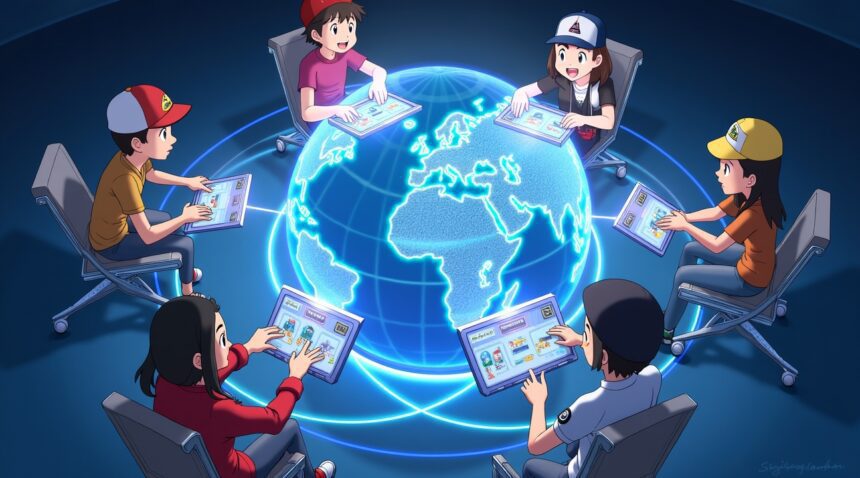The Global Trade System has transformed Pokémon gameplay by converting isolated gaming experiences into interconnected global adventures.
This system breaks down geographic barriers and version exclusivity limitations that once restricted player access to complete Pokédex collections. From its groundbreaking introduction in Pokémon Diamond and Pearl to modern platforms like Pokémon Home, GTS trading has evolved to support bulk exchanges, item bundling, and sophisticated filtering systems. These features enable millions of daily trades across international boundaries.
Key Takeaways
- Global accessibility – GTS eliminates geographic and version barriers, allowing players worldwide to obtain region-exclusive Pokémon, event distributions, and version-specific species without purchasing multiple games or maintaining extensive friend networks.
- Advanced trading capabilities – Modern platforms support bulk trading of up to 15 Pokémon simultaneously, detailed search filters for specific characteristics, and item exchanges that create comprehensive trading packages with genuine economic value.
- Community building – The system connects millions of trainers internationally through features like Wonder Trade, visual world maps showing trading connections, and integration with social platforms that foster lasting friendships across cultural boundaries.
- Rare Pokémon accessibility – Players can access shiny variants, event-exclusive legendaries, and competitively viable specimens through strategic trading, democratizing collection completion regardless of location or event attendance.
- Platform evolution – GTS has transformed from single-Pokémon trades in early generations to sophisticated systems supporting multiple exchange methods, though recent games like Scarlet and Violet have adopted different approaches with Link Trade and subscription requirements.
Revolutionizing Pokédex Completion Through Worldwide Trading
The Global Trade System has fundamentally transformed how players approach Pokédex completion by breaking down the barriers that once made collecting every Pokémon a challenging endeavor. Before GTS implementation, trainers faced significant limitations when trying to obtain specific species, often relying solely on local connections or friend networks to secure version-exclusive creatures.
Breaking Geographic and Version Barriers
GTS enables players to connect with trainers across the globe, creating unprecedented opportunities for Pokémon exchange. Version-exclusive species that once seemed impossible to obtain now become accessible through strategic online trading. Palkia, for instance, remains exclusive to Pokémon Pearl, while trainers seeking Scyther must look to Pokémon Sword for natural encounters. Through the trade network, players can easily secure these species without purchasing multiple game versions or maintaining extensive friend lists.
Regional exclusives that were previously locked behind geographic boundaries also become attainable through this global system. Trainers no longer need to travel or coordinate complex friend trades to complete their collections. The system democratizes access to rare species, making comprehensive Pokédex completion a realistic goal for dedicated players regardless of their location or social connections.
Enhanced Trading Capabilities
Modern iterations of online trading have expanded these possibilities even further. Pokémon Home, launched in 2020, processes millions of trades daily since its debut, demonstrating the massive demand for global Pokémon exchange services. This platform streamlines the acquisition process, allowing trainers to deposit specific Pokémon and request particular species in return.
The efficiency gains are remarkable compared to earlier trading methods. Players can now search for specific Pokémon using detailed filters, ensuring they find exactly what they need for their collections. Whether completing a living Pokédex or hunting for competitive specimens, the expanded trading capabilities make these goals more achievable than ever before.
GTS has also facilitated broader community engagement around competitive play, as trainers can more easily obtain the diverse species needed for various battle formats. This accessibility has contributed to more dynamic and varied competitive scenes across different generations.
The impact extends beyond simple collection completion. Players can now experience content from different regions and versions without significant barriers, enriching their overall gaming experience. Current games continue to build upon these foundations, ensuring that worldwide trading remains a cornerstone of the Pokémon experience.
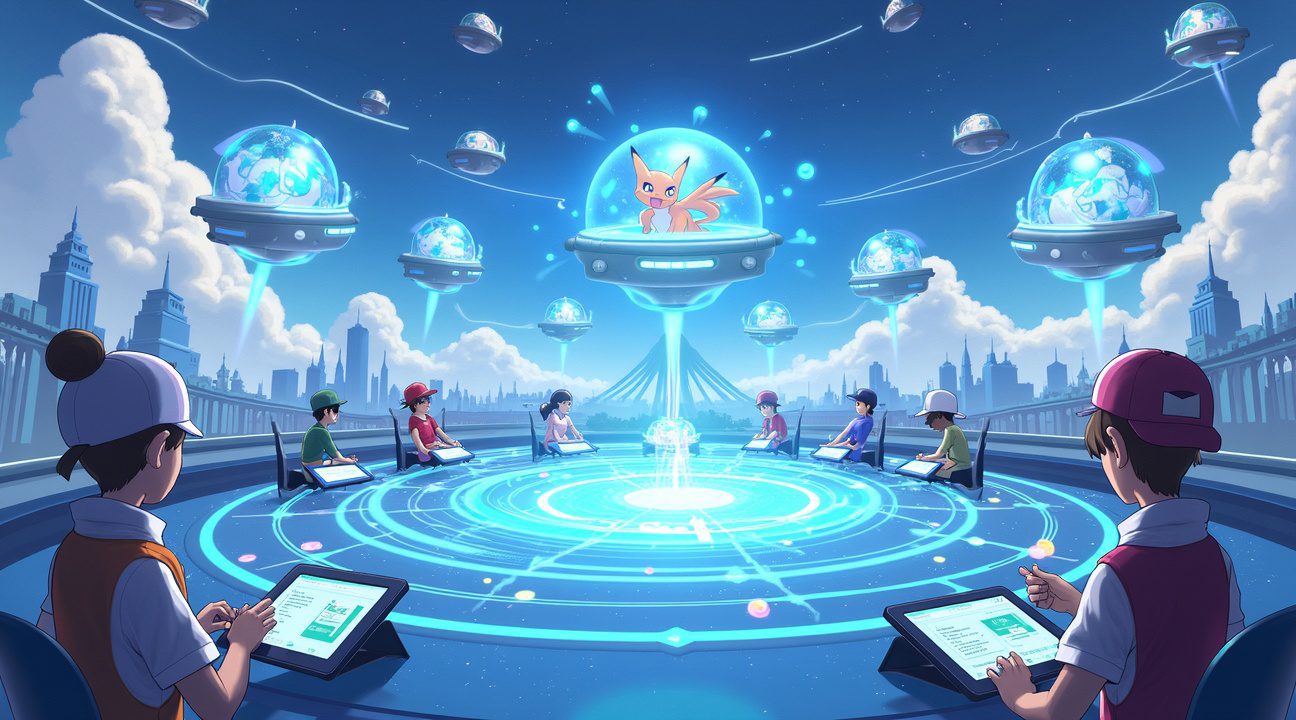
Unlocking Access to Rare, Shiny, and Event Pokémon Worldwide
The Global Trade Station transforms how I access some of the most coveted Pokémon across all generations. Through this system, I can pursue rare specimens that would otherwise require countless hours of hunting or specific event attendance. The platform functions as a massive marketplace where trainers worldwide list their prized captures, from shiny variants to region-locked exclusives.
Advanced Search Parameters for Precise Trading
GTS offers exceptional filtering capabilities that let me request Pokémon with incredibly specific characteristics. I can search for a Level 1-10 Female Shiny Gible, for instance, or hunt for event-distributed legendaries with particular movesets. These parameters include:
- Species selection from the entire Pokédex
- Gender preferences for breeding purposes
- Level ranges for competitive training
- Form variations like Alolan or Galarian types
- Shiny status verification
This granular control means I don’t have to settle for close approximations. Instead, I can target exactly what my team composition requires or what my collection lacks.
The system excels at connecting collectors across different regions, making previously impossible trades routine. Event Pokémon that were distributed exclusively in Japan can find their way to trainers in Europe or North America through GTS exchanges. Regional variants that appear only in specific countries become accessible to anyone with something valuable to offer in return.
Building a diverse collection becomes significantly more achievable when I can tap into the global community’s combined efforts. A shiny hunter in Australia might have duplicate rare finds they’re willing to trade for a specific legendary I’ve captured. Competitive players often use GTS to acquire Pokémon with perfect IVs or hidden abilities that suit their strategic needs.
The platform has evolved beyond simple species exchanges. I can now request Pokémon with specific abilities, natures, or even certain moves that might be crucial for competitive play. This flexibility proves invaluable when preparing teams for ranked battles or trying to complete difficult raid challenges.
However, the GTS system faces ongoing challenges with modified Pokémon entering circulation. Without live moderation in many titles, illegally altered specimens sometimes appear in trades. These modified Pokémon can carry impossible stat combinations or moves they shouldn’t naturally learn. While some trainers actively avoid these trades, others may unknowingly accept them, potentially affecting their game experience.
Despite these concerns, the GTS remains an invaluable resource for legitimate collectors and competitors. Recent generations have implemented better detection systems to identify obviously modified Pokémon, though the arms race between modifiers and security measures continues.
The true strength of GTS lies in its ability to democratize access to rare Pokémon. No longer do I need to attend specific events or live in particular regions to obtain certain species. A dedicated trader can build an impressive collection simply by offering fair exchanges and maintaining active listings.
Smart GTS users develop trading strategies over time, learning which Pokémon are in high demand and which are commonly available. Popular trade currencies include:
- Starter Pokémon from different generations
- Version exclusives
- Pokémon that require special evolution methods
Understanding these market dynamics helps maximize trading success and collection growth potential.
The system’s impact extends beyond individual collections to influence how entire communities approach Pokémon gathering. Current generation games benefit from this established trading culture, where players expect access to global markets for their rarest finds.
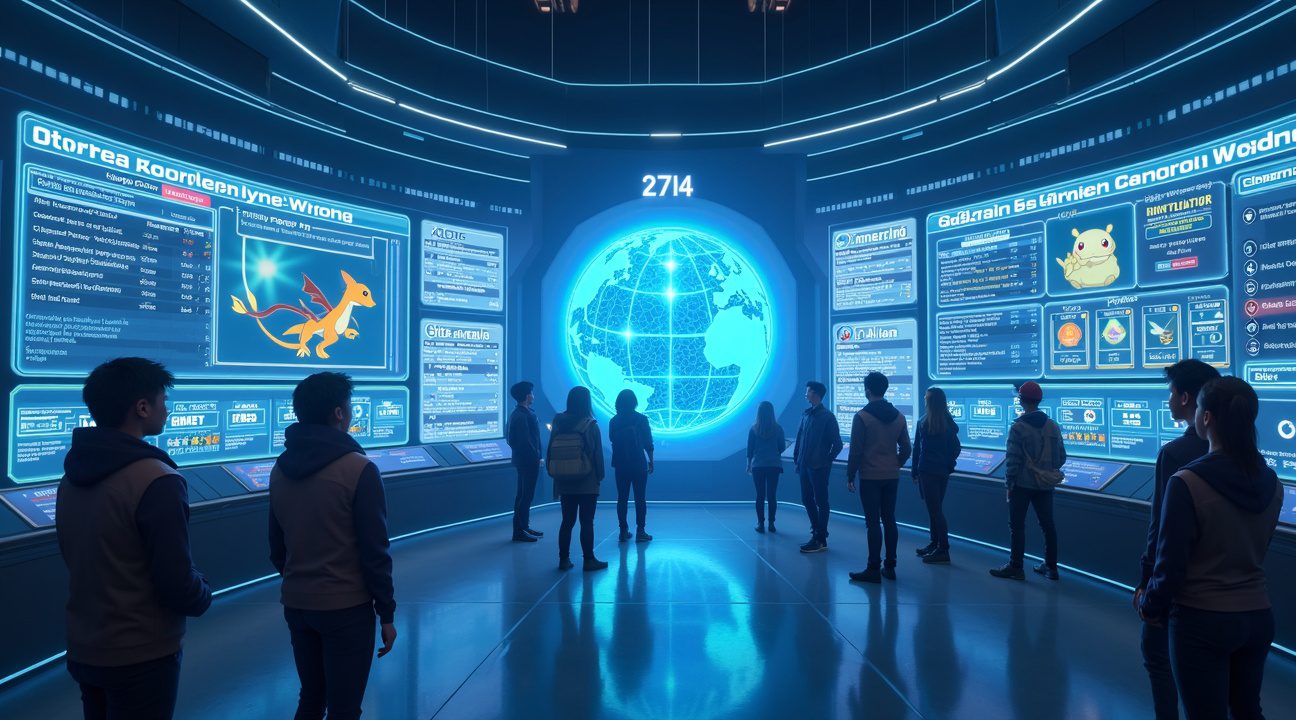
Bulk Trading and Item Exchange Capabilities
Modern GTS systems have transformed the trading experience by introducing bulk capabilities that weren’t available in earlier generations. Contemporary platforms now support trading up to 15 Pokémon simultaneously, a significant leap from the single-Pokémon exchanges that defined the original GTS through Generation 5.
These enhanced systems, including fan-created platforms like PokéHeroes, have expanded beyond simple Pokémon exchanges to include comprehensive item trading. Players can now bundle valuable items like Rare Candies, Evolution Stones, and Battle Items with their Pokémon offers, creating more complex and appealing trade packages. Anonymous trades through these systems allow for greater flexibility, as trainers can set up multiple listings without revealing their identity until a trade is accepted.
Economic Elements and Value Assessment
The evolution of bulk trading has introduced genuine economic principles into Pokémon exchanges. Trainers must now evaluate not just the species and stats of potential trades, but also the monetary worth of accompanying items and the overall package value. Some competitive Pokémon platforms assign currency values using in-game economics like PokéDollars or valuable items such as Nuggets.
This system encourages players to develop negotiation skills and market analysis abilities. A shiny Pokémon might command different values depending on whether it’s bundled with competitive items or rare collectibles. Multi-listing features allow experienced traders to create diverse portfolios, offering everything from breeding stock to battle-ready teams.
Trading flexibility has reached new heights with private and friend-based exchange options. These systems let players establish trusted networks while still participating in the broader GTS marketplace. I’ve observed how these platforms enable trainers to complete massive collection goals more efficiently than ever before, whether they’re working on Scarlet and Violet Pokédex completion or building specialized competitive teams.
The contrast with early GTS limitations is striking. Where trainers once spent hours completing individual exchanges, modern bulk systems allow for comprehensive team trades or entire collection transfers in single transactions. This efficiency has opened new strategies for competitive players and collectors alike, fundamentally changing how the Pokémon community approaches trading across all game generations.
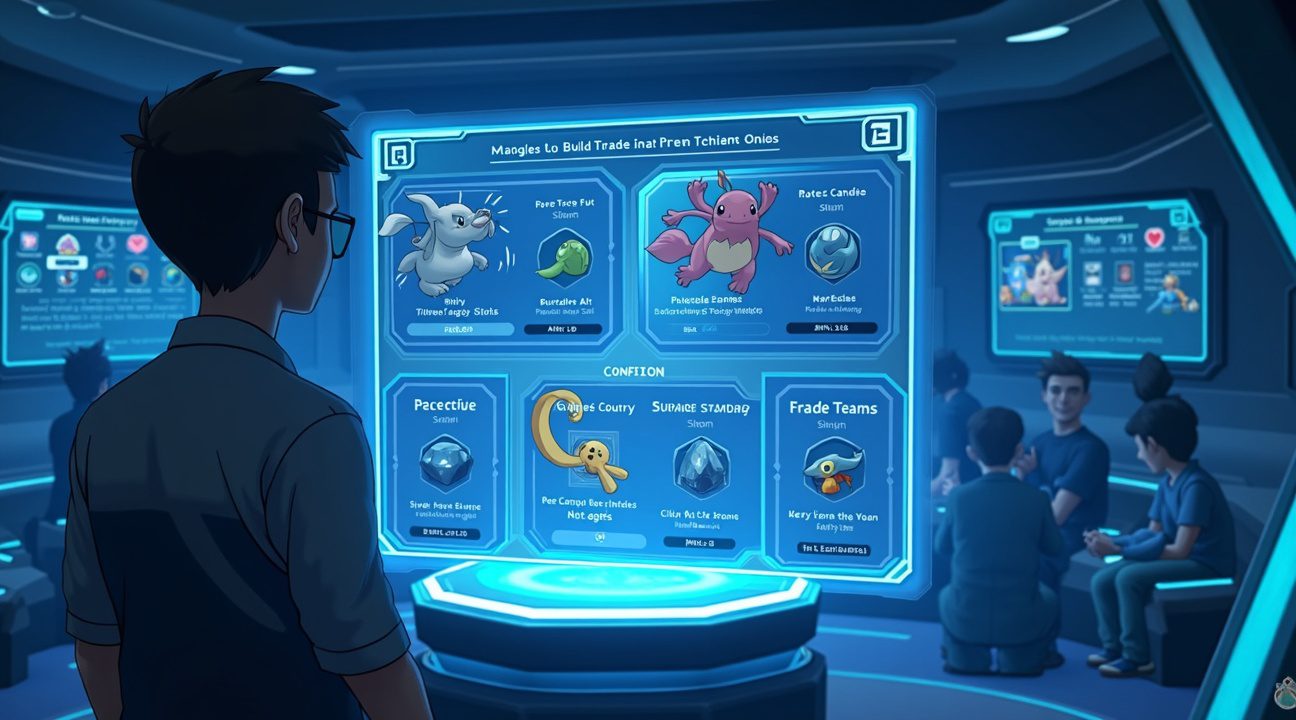
Building a Global Community Through Cross-Border Connections
The Global Trade System creates an unprecedented opportunity for trainers worldwide to connect beyond geographical boundaries. I’ve witnessed firsthand how this feature transforms solitary gameplay into a vibrant international experience, where language barriers dissolve and cultural differences become strengths rather than obstacles.
Visual Representation of Global Unity
Games like Pokémon XY and Pokémon Home brilliantly showcase this global connectivity through interactive visual elements. These titles display world maps or country lists that highlight every nation you’ve traded with, creating a tangible representation of your international connections. Each successful trade adds another pin to your virtual map, building a personal testament to the game’s worldwide reach.
This visual feedback serves more than aesthetic purposes – it demonstrates the true scope of the Pokémon community. Players can watch their trading network expand across continents, connecting with trainers from Japan to Brazil, from Australia to Sweden. The interactive globes become personal achievements, showing how a simple Pokémon exchange can bridge vast distances and connect diverse cultures.
Diverse Trading Methods and Surprise Elements
The GTS accommodates various trading preferences through multiple exchange formats. Players can choose from several approaches based on their goals and comfort levels:
- Public offers allow trainers to broadcast their trades to the entire global community
- Friend-limited exchanges provide privacy for those preferring to trade within established social circles
- One-way gifting mechanics enable generous players to donate rare Pokémon without expecting returns
- Wonder Trade systems create random global connections, adding excitement through unpredictability
Wonder Trade particularly exemplifies the system’s community-building power. This feature randomly connects players worldwide, creating moments of genuine surprise when receiving unexpected Pokémon from distant trainers. I’ve seen players receive regional variants, competitive-ready teams, or even shiny specimens through these random encounters, fostering goodwill and encouraging continued participation.
The unpredictability of Wonder Trade transforms each exchange into a small adventure. Trainers never know whether they’ll receive a common Pidgey or a carefully bred competitive Pokémon, creating anticipation that keeps the community engaged. This randomness often leads to memorable experiences that players share across social platforms, further strengthening community bonds.
External platforms have evolved to support and enhance GTS functionality. Discord servers and Reddit communities now serve as crucial organizing hubs where trainers coordinate complex trades, share breeding projects, and negotiate exchanges that extend beyond the game’s built-in limitations. These platforms enable detailed discussions about trade terms, competitive movesets, and regional exclusives that might not be easily communicated through in-game systems alone.
The integration of social media with GTS trading has created a comprehensive ecosystem where players can plan trades, verify authenticity, and build lasting friendships. These external tools complement the in-game systems by providing spaces for extended negotiation and community organization.
Regional differences add another layer of excitement to global trading. Players in different geographic locations have access to unique Pokémon variants, creating natural incentives for international exchange. This geographic diversity ensures that cross-border trading remains valuable and relevant throughout each game’s lifecycle.
The GTS has fundamentally changed how players experience Pokémon games, transforming them from isolated adventures into shared global experiences. Through simple trade mechanics, the system has created lasting connections between millions of players who might never meet in person but share a common passion for catching, training, and exchanging Pokémon across international boundaries.
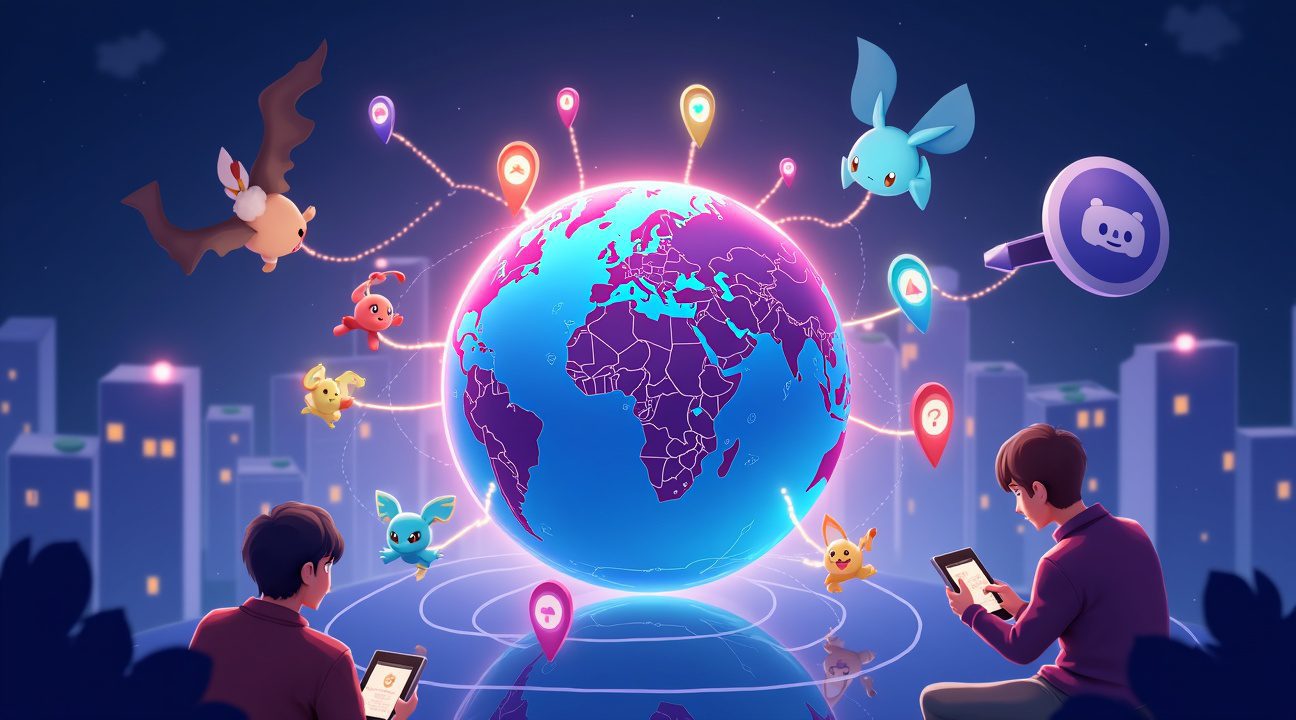
Understanding GTS Evolution and Game-Specific Limitations
The Global Trade Station has undergone significant transformations since I first encountered it in Pokémon Diamond and Pearl. Initially, this revolutionary system allowed trainers to trade only one Pokémon per transaction, which seemed groundbreaking at the time. Each trade required careful consideration since the process was limited and straightforward.
Modern platforms like Pokémon Home have revolutionized this experience dramatically. I can now transfer multiple Pokémon simultaneously, access my collection across different titles, and participate in Wonder Box trading that connects me with trainers worldwide. These advancements have created a more dynamic trading ecosystem that spans the entire Pokémon franchise.
Platform-Specific Trading Restrictions
Different games impose varying limitations that affect how I approach trading strategies. The system restricts certain categories of Pokémon from GTS transactions, which includes:
- Special form Pokémon that might cause compatibility issues
- Mythical species designated as event-exclusive
- Pokémon with suspected illegal modifications or stats
- Region-locked variants that don’t exist in certain versions
These restrictions serve to maintain game balance and prevent exploitation, though they sometimes limit legitimate trading opportunities.
Recent entries in the series have taken divergent approaches to online trading mechanics. Pokémon Scarlet and Violet completely eliminated the traditional GTS, instead implementing Link Trade and Surprise Trade systems. This shift fundamentally changed how I connect with other players for trading purposes.
The subscription requirement for Nintendo Switch Online adds another layer to consider when planning trading activities. Unlike earlier handheld systems that offered free online connectivity, current-generation games require this paid service to access any online trading functionality. This change affects how frequently I engage with trading communities and influences my overall game progression strategy.
Understanding these evolutionary changes helps me adapt my trading approach across different Pokémon titles. Each game’s unique limitations and features require specific strategies to maximize trading effectiveness. The competitive scene has also adapted to these changes, with team building often requiring careful navigation of each platform’s trading capabilities.
These platform differences highlight how the Pokémon trading landscape continues evolving. While some limitations might initially seem restrictive, they often serve important purposes in maintaining fair play and game integrity across the franchise.
The Foundation: How GTS First Transformed Pokémon Trading
The introduction of the Global Trade System in Pokémon Diamond & Pearl marked a revolutionary moment for the franchise in 2006. I witnessed firsthand how this groundbreaking platform fundamentally shifted the way trainers approached Pokémon acquisition and collection strategies. Before GTS, players were limited to local trades with friends or connections within their immediate gaming circles.
Breaking Down Geographic Barriers
The GTS established something unprecedented in the gaming industry – a shared Pokémon marketplace that connected players across the globe in real-time. Trainers could now access species exclusive to other regions, complete their Pokédexes without purchasing multiple game versions, and engage with the international Pokémon community. This system opened up trading possibilities that earlier generations couldn’t even imagine.
Regional exclusive Pokémon suddenly became accessible to everyone with an internet connection. Version exclusives that once required owning both game variants could now be obtained through strategic trades with players worldwide. The platform enabled trainers to pursue breeding projects with foreign Pokémon, unlocking the Masuda Method for shiny hunting – a technique that increased shiny encounter rates when breeding with internationally obtained Pokémon.
Evolution of Trading Strategies and Community Standards
As the GTS matured, I observed the development of sophisticated trading strategies and community-driven standards. Players began establishing trading etiquette that emphasized fairness and transparency. The platform’s growth coincided with increased awareness about potentially hacked or illegitimate Pokémon circulating through the system.
The trading community developed several key practices to maintain integrity:
- Verification of Pokémon legitimacy through stat checking and origin analysis
- Recognition of “too good to be true” offers that might indicate hacked specimens
- Utilization of in-game reporting tools to flag suspicious trades
- Development of trading ratios based on rarity and demand
- Creation of unofficial community guidelines for fair exchanges
These evolving standards helped shape how competitive Pokémon trading would develop in future generations. The GTS became more than just a trading platform – it transformed into a learning environment where trainers discovered market values, rarity tiers, and strategic breeding techniques.
The platform’s impact extended beyond simple trades. It fostered international connections between players and created opportunities for cultural exchange through Pokémon named in different languages. Players could observe global trends in Pokémon popularity and adapt their trading strategies accordingly.
Trading through the GTS also introduced concepts of supply and demand economics to the Pokémon universe. Newly released event Pokémon commanded premium trades, while common species served as entry-level trading currency. This economic framework influenced how trainers valued their collections and approached breeding projects.
The system’s influence on modern Pokémon games remains evident today. Features like Wonder Trade and Surprise Trade evolved directly from GTS foundations, while online competitive play built upon the community standards established during the GTS era. The platform demonstrated that connecting players globally could enhance gameplay experiences and create lasting communities around shared interests.
Understanding the GTS’s foundational role helps explain why trading remains such a central element in contemporary Pokémon games. The system proved that digital marketplaces could successfully facilitate complex social interactions while maintaining the core spirit of Pokémon trading that began with link cables in the original games.
Sources:
PokéHeroes – Blog posts and platform features
Nintendo – Game-specific features and trading limitations
Pokémon Home – Trading statistics and platform capabilities
Reddit – Community trading practices and social platform influence
Discord – Trade organization and global community building

